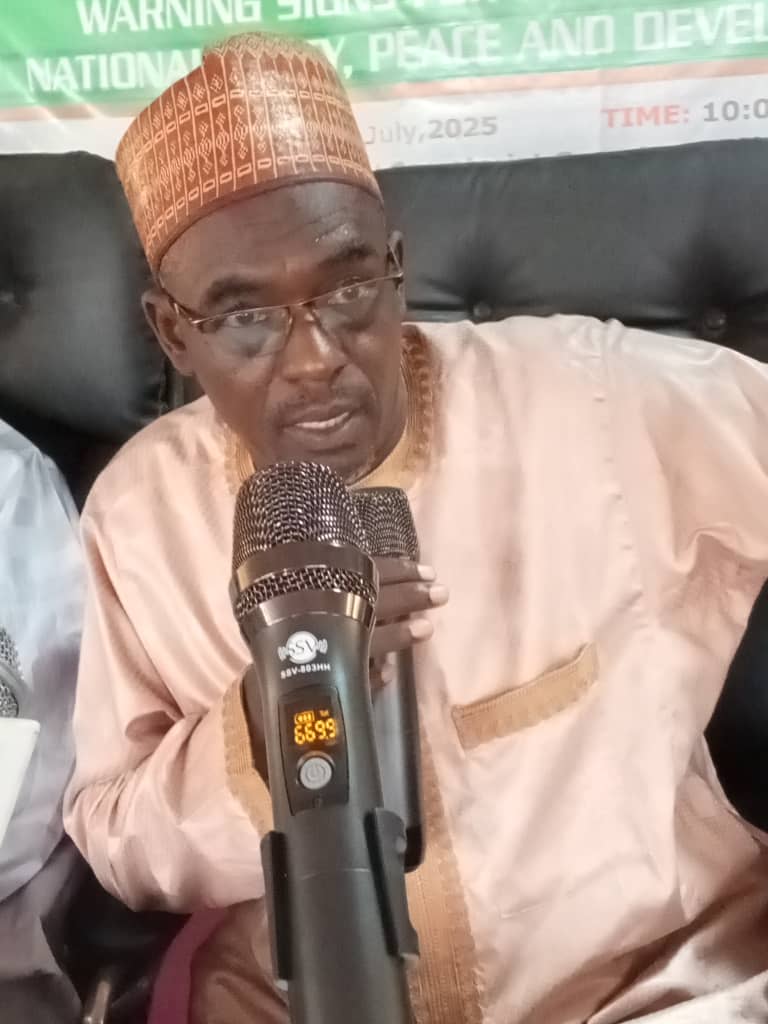Dr Sama’ila Balarabe
Department of Mass Communication
Hassan Usman Katsina Polytechnic, P.M.B. 2052, Katsina
08036185648
s.balarabe2013@gmail.com
Being a Paper Presented at a Town Hall Meeting on Rural Security Watch and Early Warning Signs Organized by the Katsina State Office of the National Orientation Agency at the Conference Hall, Federal Secretariat Complex, Katsina on Tuesday 1st July, 2025
Introduction
It is both an honour and a duty to address this vital topic “Causes of Insecurity in Our Rural Areas.” As we gather here under the theme of rural security and early warning systems, we must collectively reflect on the root causes of rural insecurity and brainstorm lasting solutions.
Rural communities like ours in Katsina State have historically been safe, closely-knit societies. However, in recent years, the tranquility of our villages has been disrupted by rising insecurity, ranging from banditry, cattle rustling, kidnapping, and communal clashes to food insecurity and socio-economic instability. Understanding the root causes is essential to developing sustainable solutions.
Definition of Insecurity
Insecurity refers to a state of being open to danger or threat; a lack of protection. In social and political terms, it denotes a situation in which people, communities, or nations face risks to their safety, livelihoods, or wellbeing due to violence, instability, or the breakdown of law and order.
According to the Oxford English Dictionary, insecurity is “the state of being subject to danger or threat; lack of safety.” The United Nations Development Programme (UNDP) defines human insecurity as “the absence of protection from chronic threats such as hunger, disease, and repression, as well as protection from sudden disruptions in the patterns of daily life.”
In the context of rural Nigeria, insecurity includes:
i. Armed attacks or killings
ii. Kidnappings for ransom
iii. Banditry and cattle rustling
iv. Communal clashes
v. Land and resource-based conflicts
vi. Violent extremism
vii. Absence of effective policing or conflict resolution systems
Background of Insecurity in Nigeria’s Rural Areas
Historically, rural areas in Nigeria were known for their peace, hospitality, and communal life. These communities depended heavily on agriculture, traditional leadership structures, and mutual support systems. However, over the past two decades, several factors have combined to threaten the safety and stability of rural life, particularly in northern Nigeria, including Katsina State.
In the early 2000s, incidents of cattle rustling and armed robbery began to spread in rural areas. These were followed by the expansion of herder-farmer conflicts, especially in the North-Central and North-West regions. Later, the rise of banditry, rural kidnappings, and terrorist activity exacerbated the already fragile security environment.
By 2014, with the growing insurgency in the North-East (notably Boko Haram and later ISWAP), weapons and fighters began to spill over into nearby regions, including Katsina, Zamfara, Kaduna, and Niger States. Weak border control, poor state presence, and worsening poverty all contributed to the spread of insecurity from isolated attacks to widespread violence and displacement.
As of 2023, according to the Global Terrorism Index and reports by Nigeria Security Tracker, rural areas in Northern Nigeria are the most affected by:
i. Daily bandit attacks on villages
ii. Kidnapping of schoolchildren and villagers for ransom
iii. Farmers abandoning farmlands due to fear
iv. Youth joining armed groups for survival or revenge
In Katsina State specifically, insecurity has disrupted farming, education, commerce, and local governance, leading to increased poverty, displacement, and fear among rural dwellers. The situation has created a cycle: insecurity deepens poverty, and poverty, in turn, fuels further insecurity.
Causes of Insecurity in Our Rural Areas
Below are some of the causes of insecurity in our rural areas:
- Poverty and Economic Disempowerment
A leading cause of insecurity in rural areas is chronic poverty. Rural communities often suffer from limited access to economic opportunities, resulting in high unemployment rates, especially among youths. This economic desperation creates fertile ground for recruitment into criminal activities, such as armed robbery, banditry, and cattle rustling.
According to the National Bureau of Statistics (2020), the majority of Nigerians living below the poverty line reside in rural areas. Poverty not only breeds discontent but also weakens community resistance to external threats. - Youth Unemployment and Idle Hands
Closely linked to poverty is the alarming rate of youth unemployment. With little or no skills, education, or access to capital, many rural youths are left idle. This condition makes them vulnerable to manipulation by criminal groups or violent extremists who promise money, power, or revenge.The United Nations Development Programme (UNDP, 2021) notes that idle and unemployed youth are among the most at-risk groups for recruitment into armed groups and gangs. - Poor Governance and Weak Security Presence
In many rural areas, government presence is minimal or nonexistent. Basic infrastructure like roads, police posts, and communication networks are either poor or absent. This weakens law enforcement and gives room for criminal elements to thrive unchallenged.
Furthermore, where security operatives exist, they are often underfunded, poorly equipped, and outnumbered. According to CLEEN Foundation (2022), rural communities in northern Nigeria report the lowest police-to-citizen ratios in the country. - Proliferation of Small Arms and Light Weapons
Another driver of insecurity is the easy access to small arms and light weapons (SALWs). Border porosity, corruption, and the collapse of law and order in neighboring regions (like parts of the Sahel) contribute to the influx of illegal arms into our rural communities.
The Small Arms Survey (2020) estimates that over 500,000 illegal firearms are in circulation in Nigeria, many of which are found in rural conflict zones. - Land Disputes and Farmer-Herder Clashes
Land-related conflicts especially between farmers and herders have significantly contributed to rural insecurity. Climate change, desertification, and population pressure have led to competition over dwindling resources like water and arable land.
These clashes often escalate into violent confrontations, leading to deaths, displacement, and destruction of property. As reported by the International Crisis Group (2021), the Middle Belt and Northwestern regions, including Katsina, have seen a sharp rise in herder-farmer conflicts. - Illiteracy and Lack of Awareness
Illiteracy levels are higher in rural areas, and this lack of education limits citizens’ ability to make informed decisions about peace, civic responsibility, and governance. It also impairs their capacity to identify early warning signs of radicalization or organized crime.
According to UNESCO (2021), rural literacy in Nigeria is below 50%, compared to urban centers. This limits access to civic education and counter-narratives against extremism and violence. - Cultural and Religious Manipulation
Some groups exploit cultural and religious sentiments to sow division or justify violence. Manipulative leaders sometimes use religion or ethnicity to radicalize youth or incite them against other communities.
A report by the National Institute for Policy and Strategic Studies (NIPSS, 2022) highlights how misinformation and hate speech spread rapidly in rural areas due to limited access to verified news sources. - Climate Change and Environmental Stress
Environmental degradation, including desertification, soil erosion, and drought, has reduced agricultural productivity in northern Nigeria. This resource scarcity leads to migration, competition, and conflicts among communities dependent on farming or herding for survival.
The World Bank (2020) projects that Nigeria could see over 30 million climate-related internal migrants by 2050, many from rural northern states like Katsina. - Corruption and Mismanagement of Local Resources
Lastly, corruption at the local government level diverts funds meant for rural development. Projects such as community policing, youth empowerment, and rural infrastructure are either underfunded or abandoned. This systemic failure erodes public trust and fosters resentment.
Transparency International (2022) ranks Nigeria poorly in the global corruption perception index, with rural development funds being among the most mismanaged.
Effects of Insecurity in Rural Areas
Insecurity has wide-ranging and devastating consequences for individuals, communities, and the nation at large. In rural areas, these effects are often more pronounced due to weaker institutions, poor infrastructure, and greater dependence on agriculture and informal economies.
- Displacement and Loss of Lives
Armed attacks, kidnappings, and communal clashes have led to the displacement of thousands of rural dwellers. People are forced to flee their ancestral homes, often ending up in Internally Displaced Persons (IDP) camps or squatting in urban slums.
According to the International Organization for Migration (IOM, 2023), over 3 million Nigerians are currently displaced due to rural insecurity, particularly in the North-East and North-West. - Decline in Agricultural Activities
Farming is the backbone of rural economies. However, insecurity has led to farmers abandoning their fields, resulting in food shortages and a rise in food prices. Many fear going to the farms due to the threat of attacks or kidnappings.
The Nigerian Ministry of Agriculture (2022) reported a 40% reduction in agricultural productivity in conflict-prone rural communities. - Economic Hardship and Poverty
Insecurity disrupts markets, trade, and local investment. The fear of attacks diges businesses, worsens poverty, and reduces the inflow of government or private development projects. - Breakdown of Education and Health Services
When insecurity escalates, schools and clinics often shut down. Teachers, health workers, and other civil servants flee for safety, leaving communities without essential services.
UNICEF (2023) reported that over 1,500 schools in Northern Nigeria had closed due to insecurity, affecting over 600,000 children. - Erosion of Social Trust and Community Cohesion
Insecurity breeds suspicion among ethnic and religious groups. Farmer-herder clashes, for instance, often escalate into long-standing intercommunal conflicts, breaking down traditional systems of cooperation and mutual assistance. - Radicalization and Rise in Youth Crime
The continued exposure to violence, combined with poverty and lack of opportunities, pushes many young people into criminal gangs, drug abuse, and armed groups. Rural youth become both victims and perpetrators of insecurity.
Solutions to Rural Insecurity
Solving rural insecurity requires a multi-dimensional and community-centered approach, involving not just the government but also traditional leaders, civil society, and the people themselves.
- Strengthening Local Security and Community Policing
Establishing and empowering community policing structures can help detect and prevent crimes early. Traditional rulers, youth leaders, and vigilante groups must be integrated into formal security frameworks with proper training, oversight, and logistics.
The Nigeria Police Force Community Policing Model (2020) offers a foundation for such localized efforts. - Economic Empowerment and Youth Engagement
Rural insecurity will persist unless young people are provided with jobs, skills, and hope. Government and NGOs should invest in vocational training, entrepreneurship support, and agricultural innovation tailored to local needs. - Education and Civic Awareness
Improving rural education formal and informal will empower people to make informed choices, recognize early warning signs of violence, and resist recruitment into criminal groups. Peace education, civic rights training, and literacy programs should be prioritized. - Dialogue and Conflict Resolution Mechanisms
Traditional leaders and local peace committees should be supported to facilitate community dialogue, especially between farmers and herders. Culturally sensitive, locally led mediation efforts can prevent violence and build trust. - Improved Rural Infrastructure and Services
Investing in rural roads, communication networks, electricity, and health facilities increases government presence and reduces the isolation that allows insecurity to thrive. Better infrastructure also enables quicker responses to threats. - Arms Control and Border Security
The government must intensify efforts to control the flow of illegal arms through better border surveillance and law enforcement. Disarmament, Demobilization, and Reintegration (DDR) programs should target ex-combatants in rural conflict zones. - Transparent and Inclusive Governance
Local governments must be accountable and transparent in their use of public funds meant for rural development. Citizen participation in decision-making can rebuild trust and ensure projects address real community needs.
Conclusion
Insecurity in our rural areas is a multi-faceted problem rooted in poverty, weak institutions, illiteracy, environmental stress, and socio-political manipulation. It threatens our livelihoods, disrupts agriculture, displaces communities, and erodes the social fabric of our society.
Rural insecurity is a deep-rooted challenge, but it is not insurmountable. With collective effort, early warning systems, inclusive governance, and sincere investment in youth and infrastructure, peace can return to our rural communities.
By focusing on the causes, understanding the effects, and implementing strategic solutions, we can safeguard our villages and restore hope to rural families.
Security is not just the job of soldiers and police it begins with every citizen, every village head, every youth leader, and every parent. Together, we can reclaim our peace.
References
CLEEN Foundation (2022). Public Safety and Security in Nigeria Report.
International Crisis Group (2021). Stopping Nigeria’s Spiralling Farmer-Herder Violence.
National Bureau of Statistics (2020). Poverty and Inequality in Nigeria: Executive Summary.
National Institute for Policy and Strategic Studies (NIPSS) (2022). Religious Radicalization in Rural Nigeria.
Small Arms Survey (2020). Measuring Illicit Arms Flows in West Africa.
Transparency International (2022). Corruption Perception Index 2022.
United Nations Development Programme (UNDP) (2021). Tackling Insecurity through Youth Empowerment.
UNESCO (2021). Nigeria Education Profile.
World Bank (2020). Climate Change and Internal Migration in Nigeria.




